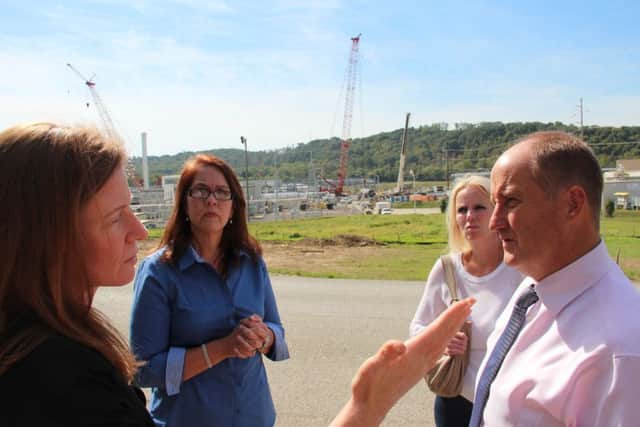How fracking split my town in two


When Amy Nassif does her weekly shop, more often than not she drives to the grocery store 10 miles away. There is one closer, just around the corner in fact, but that would risk bumping into her neighbours and reigniting the bad feelings which first boiled over when Rex Energy came to town.
“It was March 2014,” says Amy, who lives with her husband Bob and two daughters in Butler County, Pennsylvania, one of America’s fracking hot spots. “We found out that Rex wanted to drill six holes within half a mile of the local school. Things have never been the same since.
Advertisement
Hide AdAdvertisement
Hide Ad“Some of our neighbours stood to make a lot of money from leasing the mineral rights to their land. When a group of us started to campaign against the proposals they took out an injunction to silence us. It was eventually thrown out, but by then the damage had been done. The community had been split in two and I’m not sure there is any way of putting it back together again.”


The Nassifs were in England this week, partly for a family holiday, but also to speak to members of the Economic Affairs Committee, which is currently looking into the impact of shale gas development in UK, and to meet up with friends they have made in Yorkshire who are part of the Frack Free Ryedale Group.
“Bob and I weren’t really campaigning types,” says Amy. “We were just parents wanting the best for our children, but we learnt quickly. By the time Rex Energy reached our part of the county, so many wells had already been drilled in Pennsylvania that we knewthere was no point calling for a ban.
“However, we thought it was reasonable that there should be a buffer zone, so we asked that there should be at least two miles between the school and the nearest well.”
Advertisement
Hide AdAdvertisement
Hide AdAmy and the other members of the Mars Parent Group were optimistic that their voice would be heard. Just a month earlier a gas well explosion in Greene County, which left one worker dead, had heightened fears about the safety of the drilling and the impact of large scale industry on residential communities.


“Our campaign quickly gained momentum,” she says. “Within three days we had 900 signatures on a petition, but before the school board could vote on what it wanted to do next, Rex Energy was given approval to begin drilling. It was at that point that I realised just how little regard there was for the community.
“We understood that financially it would be a good thing for the district, but no one could really tells us what the other costs would be.”
As the campaign intensified, Amy and the other parents began researching fracking and they say the more they read the more worried they became.
Advertisement
Hide AdAdvertisement
Hide Ad“While the industry insists that it is a clean and safe energy supply, when you read the academic literature which is out there and talk to people who have lived near these sites for a number of years you get a very different picture. I’m not an expert or a chemist, but I can read the research.
“Around 1,000 chemicals are released through fracking, but a recent study by the Yale School of Public Health found that for 80 per cent of them there is insufficient data on their cancer causing potential. That’s not to say they can or will cause cancer, but it is a significant gap in our knowledge.
“Of the rest 44, percent of the water pollutants and 60 percent of air pollutants were either confirmed or possible carcinogens. A friend who had a gas works 800ft away from her home said her children suffered from regular nosebleeds and various unexplained health problems. When the drilling stopped, they stopped. Now maybe that’s just a coincidence, but if we are going to allow this industry to be so close to people’s homes then we need to be absolutely sure what the impact is going to be and I don’t think we do.”
Like many of the anti-fracking campaigners, Amy says the monitoring of air and water pollution is not rigorous enough, industry findings are rarely published and when they are, the data is so incomplete it’s almost meaningless.
Advertisement
Hide AdAdvertisement
Hide Ad“I know that some people think that we are only campaigning because we don’t want these wells in our back yard,” she says. “Yes, that’s why we became involved, but this is bigger than us.”
Last year Thirsk and Malton MP Kevin Hollinrake, whose constituency covers a number of potential fracking sites, visited Pennsylvania and came back reassured by what he saw. So persuasive was he about what he had found that Joanna and Steve White from Frack Free Ryedale also decided to head out to the US.
Like Mr Hollinrake, as well as anti-fracking campaigners, they also spoke to the operations manager of a gas company and those who had benefitted financially from leasing their mineral rights. However, they drew very different conclusions about the likely impact of the industry.
“When we went out to Pennsylvania we were looking forward to being reassured,” says Steve. “Everyone involved in Frack Free Ryedale is a volunteer, it’s time consuming and we would all much rather be doing something else with our spare time. However, we couldn’t see an upside. It felt like we had gone to two different places.
Advertisement
Hide AdAdvertisement
Hide Ad“The drilling sites were dusty, it was often too noisy to hold a conversation and while the bars of Susquehanna County had done well from the gas workers there was no evidence of a wider economic boom. Houses prices had gone down and we met someone who had been dependent on bottled water for eight years because his well water had been contaminated.”
It was while out in Pennsylvania that the couple met the Nassifs and the more they talked, the more Amy says she saw parallels between the US experience and the beginnings of the industry in the UK.
“The influence of money and the power of the oil and gas industry is not to be underestimated,” says Amy. “Fracking isn’t an invisible industry. It requires compressor stations, dehydration plants and pipelines and they can’t all be hidden away from sight. It doesn’t operate in a bubble.
“Just like you, we were told that there would be gold standard regulations, that the gas companies are good neighbours, but the reality has been very different. It’s an industry where people are masters of passing the buck.”
Advertisement
Hide AdAdvertisement
Hide AdWhen Amy flies home another hearing is looming and with a judicial review into North Yorkshire County Council’s decision to approve a fracking site due to be heard later this month, the Whites and Frack Free Ryedale are also gearing up for another bout.
“I have seen how much our community has been changed by this industry,” says Amy. “But we will keep on fighting. We don’t have any other option, there is too much more to lose.”